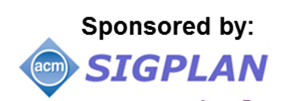 |
||||||||||
|
 3rd ACM SIGPLAN Program Protection and
3rd ACM SIGPLAN Program Protection and
Reverse
Engineering Workshop (PPREW 2014)
The US Grant, San Diego, CA
January 25, 2014
Collocated with
POPL
2014
Publication

Accepted papers are now published in the
ACM Digital Library.
Early Registration Information
Cutoff for hotel discounted rate: December 21, 2013
Early registration deadline: December 31, 2013
POPL'14 will be held at the The US Grant in San Diego, CA, USA.
A link to the hotel on-line reservation service with special pricing for POPL attendees will be provided when you register for the conference. The link is provided in your registration receipt. The discounted daily hotel rates are $179 for non-students and $109 for students. The cutoff for the discounted hotel rate is December 21st, 2013.
Note:
PPREW-only attendees will choose the One-Day Pass option on the POPL registration site.
About PPREW
Program protection and reverse engineering are dualisms of good and evil. Beneficial uses of reverse engineering abound: malicious software needs to be analyzed and understood in order to prevent their spread and to assess their functional footprint; owners of intellectual property (IP) at times need to recover lost or unmaintained designs. Conversely, malicious reverse engineering allows illegal copying and subversion and designers can employ obfuscation and tamper-proofing on IP to target various attack vectors. In this sense, protecting IP and protecting malware from detection and analysis is a double-edged sword: depending on the context, the same techniques are either beneficial or harmful. Likewise, tools that deobfuscate malware in good contexts become analysis methods that support reverse engineering for illegal activity.
PPREW invites papers on practical and
theoretical approaches for program protection
and reverse engineering used in beneficial
contexts, focusing on analysis/deobfuscation of
malicious code and methods/tools that hinder
reverse engineering. Ongoing work with
preliminary results, theoretical approaches,
tool-based methods, and empirical studies on
various methods are all appropriate.
- Obfuscation / deobfuscation
- Tamper-proofing
- Hardware-based protection
- Side channel analysis vulnerabilities
- Theoretical
analysis
frameworks:
- Abstract Interpretation
- Term Rewriting Systems
- Machine Learning
- Large Scale Boolean Matching
- Software watermarking
- Digital fingerprinting
- Reverse engineering tools / techniques
- Program / circuit slicing
- Component / functional Identification
- Source code (static/dynamic) analysis
- Information hiding and discovery
Important Dates
| Paper Submission (extended): | November 8, 2013 |
| Author Notification: | December 1, 2013 |
| Camera Ready: | December 20, 2013 |
| Workshop: | January 25, 2014 |
![]()